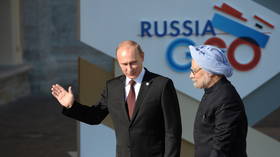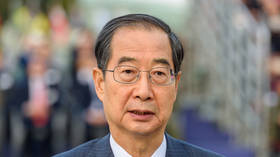ROAR: “Western media deliberately playing Medvedev off against Putin”

Political scientists and journalists of the Valdai discussion club have noted Dmitry Medvedev now looks more like president than a year ago.
The latest statements of Medvedev and Prime Minister Vladimir Putin about their plans for the next presidential election have become, in recent days, the main topic for commentators. Many of them note that the “uncertainty” in this issue still remains.
Medvedev’s words about the possibility of his running for president in 2012 “put an end to allegations of ‘seers’ who made a conclusion about Vladimir Putin’s return to presidency at that time,” Pavel Salin, analyst at the Center of Political Conjuncture, said.
Speculations in the media appeared last week following Putin’s meeting with political scientists of the Valdai discussion club. Putin clearly said that the candidacy for president “would be discussed by ‘the tandem’ closer to the date of election,” Salin said.
However, some analysts have decided that, for whatever reason, Putin has thus “unambiguously spoken about his presidential ambitions he added.
The analyst believes that Medvedev and Putin will have to maintain “the ambiguity” until the announcement of the coordinated candidacy. They will continue making different statements which “observers will interpret alternately in favor of the president or the prime minister,” he added.
Aleksandr Rahr, director of the Russian/Eurasia Program of the German Council on Foreign Relations, told newspaper Vremya Novostey that the issue of the next election has not been decided yet between Medvedev and Putin.
Fyodor Lukyanov, editor-in-chief of Russia in Global Affairs magazine, told the same paper that it was senseless to seek the prediction of the future in Medvedev’s words. “I came to the conclusion that both [Medvedev and Putin] are tired of these questions and so their answers are so cagey,” he said.
However, members of the Valdai discussion club were interested not just in Medvedev’s plans for 2012. They stressed the importance of his latest public statements, including his keynote article in the Russian media and a speech at the Yaroslavl conference “The Modern State and Global Security.”
Nikolay Zlobin, director of the Russia and Eurasia Programs at the World Security Institute, believes that the date of the publication of Medvedev’s program article was “the first day” of his presidency.
"He became president “because Putin asked him to,” Zlobin told Vremya Novostey. “Now [Medvedev] should proceed to practical work, otherwise he will remain a president of one article,” he added.
The analyst also compared his impression of Medvedev at the meeting of the Valdai discussion club with a similar event that took place in September 2008. Medvedev “looked more like president than a year ago, and I understood that he would decide himself on the participation in the 2012 election,” Zlobin told Gazeta daily.
As for Medvedev’s article, “it was very strong,” Zlobin said. “Now a national discussion will probably start over it,” he added. “We’ll see if there will be an emotional feedback in society, especially from the youth, which have been apolitical so far.”
Western political scientists and journalists asked the president if he formulated in his article, and the speech in Yaroslavl, the main theses of “Medvedev’s plan that is coming to take the place of Putin’s plan,” Nezavisimaya Gazeta wrote. “Medvedev had to say that they were not mistaken,” the paper added.
Rahr, in his turn, told Kommersant daily that “Putin’s plan is gradually transforming into Medvedev’s plan.” The analyst noted that the president’s article and his speech had been “warmly met in the West.”
“Now the following is happening: the Western press, in my view, is deliberately playing Medvedev off against Putin,” Rahr told Nezavisimaya Gazeta. “After the publication of Medvedev’s article the western media wrote that he was a president of breakthrough,” he added.
At the same time, many Russian analysts note that there have been no disagreements in “the tandem” so far. Medvedev has his own projects important for the country, analyst Tatyana Stanovaya wrote on politcom.ru website. She called the president’s political project announced in the recent days “a new mission” but stressed that Putin supports this mission.
“Putin and Medvedev take all decisions together,” Stanovaya said. “In the present conditions, despite many doubts, it is clear that tandemocracy is effective,” she added. The variant with the participation of both leaders in the presidential election in 2012 is ruled out, she added.
Russia’s relations with the West have become another important issue at the meeting of Western political scientists with the Russian leadership. Observers noted that the tone of Medvedev’s words about the US at the Valdai club’s meeting was not as harsh as at his speech in Yaroslavl.
Fyodor Voytolovsky, head of the international politics department of the Institute of International Economy and International Relations explains this by the ambivalent situation in relations between Moscow and Washington.
On the one hand, the two countries have many topics to coordinate, including those regarding strategic offensive weapons, cooperation on Afghanistan and international terrorism, as well as the North Korean nuclear program and non-proliferation, Voytolovsky told Gazeta daily.
“On the other hand, we have different views on perspectives of the development of many states of the post-Soviet space and different issues of international security,” the analyst added.
In Yaroslavl the president “chose a critical tone” to show that Russia will defend its positions, Voytolovsky said. At the meeting with political scientists, he made it clear that Moscow was interested in improving relations with the US, the analyst added.
Lukyanov, on the contrary, believes that Medvedev did not say anything unexpected in Yaroslavl. “His rhetoric boiled down to the wording ‘we know who is responsible for the crisis’, but this had been said earlier, and there was no harshness in that,” Lukyanov told Gazeta.
The president stressed that he had communicated most with Barack Obama compared to other world leaders, Lukyanov noted. “They spent together eight hours in all. According to Medvedev, it is a kind of record,” the analyst said.
Medvedev stressed that “he likes Obama’s attitude,” Lukyanov went on to say. They differ much from those of his predecessor, he said. In George Bush’s days in office, his entourage, not the president himself “formulated the position,” the analyst added.
Sergey Borisov, RT












